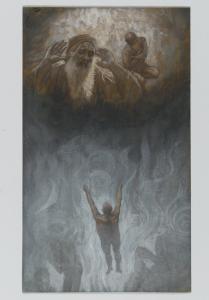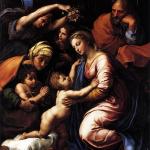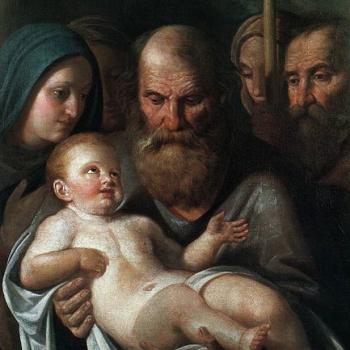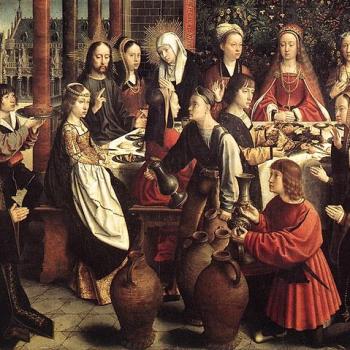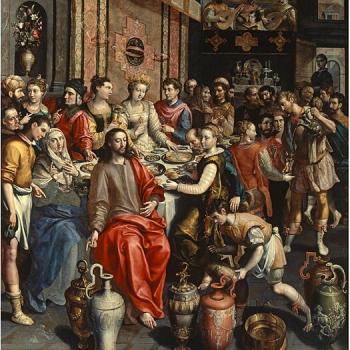Lucas Banzoli is a very active Brazilian anti-Catholic polemicist, who holds to basically a Seventh-Day Adventist theology, whereby there is no such thing as a soul that consciously exists outside of a body, and no hell (soul sleep and annihilationism). This leads him to a Christology which is deficient and heterodox in terms of Christ’s human nature after His death. He has a Master’s degree in theology, a degree and postgraduate work in history, a license in letters, and is a history teacher, author of 25 books, as well as blogmaster (but now inactive) for six blogs. He’s active on YouTube.
This is my 31st refutation of articles written by Lucas Banzoli. As of yet, I haven’t received a single word in reply to any of them (or if Banzoli has replied to anything, anywhere, he certainly hasn’t informed me of it). Readers may decide for themselves why that is the case. I use RSV for the Bible passages unless otherwise indicated. Google Translate is utilized to render Lucas’ Portugese into English. His words will be in blue.
*****
I’m replying to large portions of Lucas’ article, “Analisando as “provas” da intercessão dos santos” [Analyzing the “evidence” of the saints’ intercession] (8-13-12).
In my last article on the subject, I proved that biblically there is no possibility for those who have died to intercede for those who are alive.
Lucas is here going to argue from his false belief in soul sleep: a heresy that I have thoroughly refuted. John Calvin devastated the position in a brilliant refutation called “Psychopannychia, or the Soul’s Imaginary Sleep.” There was nothing left of this wrongheaded, utterly unbiblical fable after he got through with it. When Calvin (like Luther) argues in favor of truth, he’s great.
Biblical truth is quite different from that. We show that, in the view of the biblical writers, the dead do not praise God (Is. 38:18-19), do not even remember Him (Ps.6:5),
Isaiah 38:18-19 For Sheol cannot thank thee, death cannot praise thee; those who go down to the pit cannot hope for thy faithfulness. [19] The living, the living, he thanks thee, as I do this day; the father makes known to the children thy faithfulness.
Psalm 6:5 For in death there is no remembrance of thee; in Sheol who can give thee praise?
Many Protestant commentators hold that the above two passages express a lack of energy or will power in Hades / Sheol, as opposed to non-existence or unconscious “sleep.” Elsewhere in Isaiah and Ezekiel and Luke the inhabitants of Sheol are described as quite conscious:
Isaiah 14:9-11 Sheol beneath is stirred up to meet you when you come, it rouses the shades to greet you, all who were leaders of the earth; it raises from their thrones all who were kings of the nations. [10] All of them will speak and say to you: ‘You too have become as weak as we! You have become like us!’ [11] Your pomp is brought down to Sheol, the sound of your harps; maggots are the bed beneath you, and worms are your covering.
In Ezekiel (32:24-25, 30), Sheol is described as a place where the inhabitants “bear their shame”: obviously a conscious event. People there talk and describe others who have joined them in Sheol:
Ezekiel 32:21 The mighty chiefs shall speak of them, with their helpers, out of the midst of Sheol: `They have come down, they lie still, the uncircumcised, slain by the sword.’
The “rich man” whom Jesus describes is consciously tormented in Sheol / Hades (Lk 16:23-25) and prays to Abraham (16:24, 27-28, 30), and Abraham replies (16:25-26, 29, 31). That is hardly consistent with being profoundly “asleep” or unconscious.
do not know anything that happens under the sun (Ec.9:5,6), has no knowledge (Ec.9:10), among many other evidences that we found.
Ecclesiastes 9:5-6, 10 For the living know that they will die, but the dead know nothing, and they have no more reward; but the memory of them is lost. [6] Their love and their hate and their envy have already perished, and they have no more for ever any share in all that is done under the sun. . . . [10] Whatever your hand finds to do, do it with your might; for there is no work or thought or knowledge or wisdom in Sheol, to which you are going.
If the first clause of 9:5 is understood in an absolute sense, then so must the second clause be interpreted. Thus, the dead would have no “reward” as well as no consciousness. This would deny the resurrection and the rewarding of the righteous (see Rev 20:11-13; 21:6-7; 22:12, 14). Obviously, then, a qualification of some sort has to be placed on Ecclesiastes 9:5. In the very next verse, we learn that:
. . . they have no more for ever any share in all that is done under the sun. . . .
In other words, in relation to this world, the dead know nothing, but they are in a different realm, where they do know something. As further examples of this limited sense of “not knowing anything” in Scripture, see 1 Samuel 20:39 and 2 Samuel 15:11, where an interpretation of unconsciousness would be ridiculous.
We have also seen that the New Testament does not contradict the Old; on the contrary, it corroborates with it, for it tells the same truths.
Yes, I totally agree! We saw, for example, that Luke 16, which records a story told by Jesus, gives us a lot of very specific and enlightening information about conscious activities of souls in Sheol, including asking someone other than God to help fulfill intercessory requests.
In this present article, I will refute the isolated passages, distorted and manipulated by some Catholics as supposed “proof” of the intercession of dead saints. As is common with all sects, they also have the isolated passages that are transmitted to their faithful. One of them is the one that says:
Jeremiah 15:1 Then the LORD said to me, “Though Moses and Samuel stood before me, yet my heart would not turn toward this people. Send them out of my sight, and let them go!
With this, Catholics preach that Moses and Samuel interceded for the Israelites. But the passage is far from saying that. God does not say, “Moses and Samuel are interceding before me”; on the contrary, it says: “Even if Moses and Samuel stood before me…”. The difference between one sentence and another is blatant, you just don’t realize who is profoundly ignorant of grammar.
While the first would show that in fact Moses and Samuel were interceding for them (but that is not what the text says), the second just shows that God would not answer anyone, even if hypothetically one of those two saints of the past could revive to intercede for them. people of Israel.
The assertion of the hypothetical scenario shows that it is possible (and likely that it actually occurs). Moses and Samuel were renowned for their intercessory powers (Ex 32:11-12; 1 Sam 7:9; Ps 99:6). God would not have mentioned these men if it weren’t possible or “thinkable” that they could ever intercede in this way. He simply would have said, “my heart will not turn toward this people.”
The thought here is different. He’s saying, in effect: “even the very best and most effective intercessors will not be able to change my mind on this, if they pled with me.” It would be pointless to make note of what is impossible. It would be like me saying, “Even if a square could simultaneously be a circle, I wouldn’t change my mind.” It’s pointless and meaningless to refer to inherent impossibilities.
It wasn’t that they couldn’t or shouldn’t have prayed; rather, even their great prayers couldn’t accomplish something if it was already against the will of God. If they in fact weren’t praying to God after their deaths, or shouldn’t have, then God wouldn’t have said that they could do so; and/or would have condemned it, having brought it up at all in inspired revelation.
In fact, Samuel is referred to as in conscious existence after death, and Saul made an intercessory request of him and he turned it down (rather than say Saul should only pray to God: see 1 Sam 28:3, 13-19). Moses appears, still conscious after death, to Jesus (with Elijah), at the Transfiguration (Mt 17:1-3). In the deuterocanon, it’s stated that Jeremiah continues to pray for the Jews and Jerusalem after his death:
2 Maccabees 15:13-14 Then likewise a man appeared, distinguished by his gray hair and dignity, and of marvelous majesty and authority. [14] And Onias spoke, saying, “This is a man who loves the brethren and prays much for the people and the holy city, Jeremiah, the prophet of God.”
Then we have this passage:
Revelation 6:9-11 When he opened the fifth seal, I saw under the altar the souls of those who had been slain for the word of God and for the witness they had borne; [10] they cried out with a loud voice, “O Sovereign Lord, holy and true, how long before thou wilt judge and avenge our blood on those who dwell upon the earth?” [11] Then they were each given a white robe and told to rest a little longer, until the number of their fellow servants and their brethren should be complete, who were to be killed as they themselves had been.
As I wrote two days ago:
This is known as an imprecatory prayer: praying for judgment of one’s enemies by God. Wikipedia, “Imprecatory Psalms” states: “Major imprecatory Psalms include Psalm 69 and Psalm 109, while Psalms 5, 6, 11, 12, 35, 37, 40, 52, 54, 56, 57, 58, 59, 79, 83, 94, 137, 139 and 143 are also considered imprecatory.” king David asked: very similarly to these “souls” of Revelation 6 in heaven: “How long shall my enemy be exalted over me?” (Ps 13:2). And again, he cried to God: “How long, O LORD, wilt thou look on? Rescue me from their ravages, . . .” (Ps 35:17; cf. 74:10; 94:3; 119:84; see other OT instances of “how long . . . ?).
Revelation 6:10 is exactly this sort of prayer, made by those in heaven in relation to people on earth. God did answer it, in effect saying, “just wait a little while longer and be patient, and you will see that I will judge them in due course.” And the Book of Revelation shows how He will do precisely that. So these departed saints (as well as angels) are aware of our prayers and desires. We know that from the two Scriptures above and also the following ones:
Revelation 5:8 . . . the four living creatures and the twenty-four elders fell down before the Lamb, each holding a harp, and with golden bowls full of incense, which are the prayers of the saints;
Revelation 8:3-4 And another angel came and stood at the altar with a golden censer; and he was given much incense to mingle with the prayers of all the saints upon the golden altar before the throne; [4] and the smoke of the incense rose with the prayers of the saints from the hand of the angel before God.
Another passage used by them is found in Revelation 8:4, which says that “the smoke of the incense rose with the prayers of the saints from the hand of the angel before God” (Rev.8:4). However, this is due to a bad Catholic interpretation of what the “saints” would be. Biblically, the saints are the living who keep the word of God and the testimony of Jesus Christ (Rev.12:17), not those who have died and been canonized by some institutional Church based in Rome or elsewhere.
As with most biblical words, this has more than one meaning. In Revelation 5 and 8, “saints” simply means “all Christians.” This would be a much larger class than canonized Catholic saints. We have no problem with it, and our argument is unaffected by this desperate the non sequitur and attempt to dismiss the passage before even attempting to interpret it in a way other than Catholics have. The prayers are coming from those on the earth, and dead Christians and angels in heaven somehow possess them. That’s the whole point!
The actual question at hand is: “what are these angels doing with human [earth-originated] prayers? Why are they involved with them at all? How did they get them?” And the same goes for Revelation 5:8 above. The 24 elders are considered dead Christians. Why do they have “the prayers of the saints”? In Catholic theology, it makes perfect sense. In Protestant theology it doesn’t at all. Lucas futilely tries to sidestep the whole question with irrelevancies. It won’t work when I am around to call him on it.
Paul said:
“Do you not know that the saints will judge the world? And if the world is to be judged by you, are you incompetent to try trivial cases?” (1 Corinthians 6:2)
It doesn’t take a theologian to see the obvious parallelism here. Paul says that “the saints” will judge the world, and then says that these saints are “you”. In other words, for Paul the “saints” are not those who have already died and who are supposedly in Heaven interceding for us, but those who are alive and who were even reading that letter!
Yes, in that context, it meant “all Christians” and in this instance, in context, the ones alive on the earth. It doesn’t follow that Paul thereby precludes a usage of saints alive after death in heaven (which would be equivalent to the 24 elders” of Rev 5:8). Lucas simply assumes that without argument or reason (other than his desire to refute Catholics by any means: irrational, false, or not). But that misses the point again. The “saints” referred to in Revelation 5 and 8 don’t have to be simply in heaven. The prayers appear to be coming from the “saints” (i.e., Christians) on earth. And this is our argument for the intercession of (dead) saints and angels.
Paul elsewhere refers to saints in heaven: “. . . the coming of our Lord Jesus with all his saints” (1 Thess 3:13). Marvin Vincent, in his Word Studies in the New Testament comments on this: “Saints is often explained as angels; but the meaning is the holy and glorified people of God.”
Therefore, the term “saints” applies to living believers, and so we are to understand Revelation 8:4, which says that the smoke of the incense that contained the intercession of the saints “went up” before God. Now, if the biblical text they use says that it “went up”, then it is because it came from earth and not from Heaven.
If the prayer of the saints (which Catholics say applies to the saints who are in Heaven canonized by the Catholic Church) came from Heaven, it would not “ascend” to God in Heaven, for they would already be there! Therefore, this “going up” makes it evident that the prayer really came from those saints who were on earth, as we see throughout Holy Scripture.
Exactly our argument, yes. They came from earth, and the elders and angels in heaven got them somehow and presented them to God. Lucas seems to think the prayers are not from earth (as Catholics construe the argument). As usual, he is out to sea as to what our beliefs even are, let alone the biblical rationales for them. And so he is not effectively responding. He’s battling against straw men again. But (to nitpick a bit) he is wrong about “went up” or “rose” in Revelation 8:4. That’s simply describing the incense and prayers going up to God, Who is higher up on a throne: all in heaven. We know that from Isaiah 6:1: “I saw the Lord sitting upon a throne, high and lifted up.”
Finally, some make use of the parable of the rich man and Lazarus as a last desperate attempt to “prove” the intercession of the saints.
It’s but one of several dozen arguments — none of them “desperate” — that I myself have written about (perhaps one or two even semi-original).
However, what we see in this latest attempt is that:
1. Luke 16:19-31 is a parable, and as such its means are not to be taken literally.
The Protestant Benson Commentary stated:
[T]he characters in [the story] are drawn in such lively colours that many have been of opinion, in all ages of the church, that it is not a parable, but a real history. . . . It matters not much, however, to us, in the application of it, whether it be a parable or a real history, since the important truths contained in it are equally clear and equally certain, in whichever light it be considered.
Likewise, Matthew Poole’s Commentary:
It is a question of no great concern for us to be resolved about, whether this be a history, or narrative of matter of fact, or a parable. Those that contend on either side have probable arguments for their opinion, and it may be they best judge who determine it to be neither the one nor the other, but a profitable discourse, that hath in it something of both. Our chief concern is to consider what our Lord by it designed to instruct us in.
Bengel’s Gnomen takes a middle position: “it is a parable, though a true narrative may lie underneath it . . .”
If so, we should also grant literalness to the means of other parables, which would even include the one in which the trees converse with each other (2 Ki.14:9). Will Catholics use this other parable as “proof” that trees also intercede for the living and really talk to each other? Of course not. But it is not the same as the parable of Lazarus!
2 Kings 14:9 is not a parable (nor analogous to Luke 16), but rather, non-literal Old Testament hyperbole: and understood as such by everyone.
People are never named in parables. In this story, three people are named: Lazarus (Lk 16:20, 23), Abraham (16:23-24), and Moses (16:29, 31). Parables refer to people impersonally; for example: “a man who sowed good seed” (Mt 13:24), “a king” (Lk 14:31-42), “master of the house” (Mt 24:42-44), “evil servant” (Mt 24:48-51), “a man taking a far journey” (Mk 13:34-37), “a judge” (Lk 18:2), “a widow” (Lk 18:3), “a certain man” (Lk 13:6), “a certain rich man” (Lk 12:16), and so forth.
Parables also always have an earthly (usually agricultural-type) setting, which the people hearing could relate to. In Luke 16, Hades (16:23) and “Abraham’s bosom” (16:22) refer to the afterlife, showing that this is not a parable. And parables are usually — if not always — also prefaced by a statement (usually by the Bible writer, not Jesus) that the words following are to be considered a “parable.”
But even if we grant for the sake of argument that it is a parable, the difficulties for Protestants are not overcome at all, since even parables cannot contain things that are theologically false, lest Jesus be guilty of leading people into heresy by means of untrue illustrations or analogies.
In fact, my contention would be even stronger if it is a parable, for in a non-parable, a person could do or say something theologically incorrect. But in a parable taught by an omniscient Jesus, Who is God, in an inspired, infallible revelation, falsehood could not be “enshrined.” What Jesus is teaching His hearers cannot contain theological error, and arguments by analogy (basically what the parables are) cannot contain false principles. We can only conclude, then, that Jesus sanctioned “prayer to” dead men for requests. That is the traditional notion of “communion of saints.”
Abraham says no (16:25-26), just as God will say no to a prayer not according to His will. He asks him again, begging (16:27-28). Abraham refuses again, saying (16:29): “They have Moses and the prophets; let them hear them.’” He asks a third time (16:30), and Abraham refuses again, reiterating the reason why (16:31).
How this does not support the principle of saints interceding and being able to intercede is a mystery to me. If we were not supposed to ask saints to pray for us, I think this story would be almost the very last way to make that supposed point.
Abraham would simply have said, “you shouldn’t be asking me for anything; ask God!” In the same way, analogously, angels refuse worship when it is offered, because only God can be worshiped [I cite Rev 19:9-10; 22:8-9; Acts 10:25-26; 14:11-15 to back up my point] . . .
If the true theology is that Abraham cannot be asked an intercessory request, then Abraham would have noted this and refused to even hear it. But instead he heard the request and said no.
Jesus couldn’t possibly have taught a false principle. . . .
Abraham doesn’t deny that he is able to potentially send Lazarus to do such a thing; he only denies that it would work (by the logic of “if they don’t respond to greater factor x, nor will they respond to lesser factor y”). Therefore, it is assumed in the story that Abraham had the ability and authority to do so on his own. . . .
All this shows is that an intercessory prayer can be rejected by God (or, here, Abraham), if it isn’t according to God’s will. It doesn’t disprove the manifest ability to make an intercession of father Abraham. . . .
[T]he point is not that it is merely “the mistake of a damned sinner.” Rather, it is a supposed “mistake” which Abraham did not correct, and which (ultimately) Jesus Himself did not correct within the story. Thus, according to this flawed and fallacious logic, Jesus sanctioned a very serious theological error (which is not possible!). . . .
[I]t is blasphemous to worship anyone but God; therefore, Paul and Peter and angels all specifically refuse worship and rebuke such a notion. Thus, if a prayer to Abraham was similarly blasphemous, in the story given by the omniscient Jesus, he certainly would have rebuked the prayer request and pointed the rich man to God. But he doesn’t. He simply says that the request (not the very notion of prayer itself!) is denied. If the prayer were improper this certainly would have been pointed out, lest Jesus lead astray His followers into seriously false and dangerous doctrine (according to how Protestants view it).
So Lucas hasn’t disproven the use of Luke 16 as a proof of intercession of the saints at all: not in the slightest. He thinks he has, but in fact he has not.
In view of these facts, it is ignorant to try to “prove” the intercession of the saints by using some isolated and distorted passages of the Bible,
How could any part of inspired, infallible revelation be “isolated”? All of Scripture is important. It’s all there for a reason; to teach us. Luke 16 has a purpose, and Jesus had a point to make. What was it, pray tell? Lucas hasn’t told us. All he’s done is pretended that he has refuted the Catholic interpretation. But even if he had (and if us wicked Catholics were dead wrong), it would still be his intellectual burden to tell us what it does mean. We have “distorted” nothing, either. What we have done is accepted the authority of a teaching of our Lord Jesus, and given it the most straightforward interpretation, instead of trying to make up a bunch of excuses for dismissing it.
which, when put to the test in the light of exegesis,
What exegesis? Lucas rarely does any. And as usual in my replies, I run rings around him with Scripture, by routinely producing five, ten times or more relevant Scripture than he ever brings to the table. And I interact with his arguments, whereas he has never yet done that with mine.
prove to have no evidence alleged by Catholics, but are easily refuted and collapsed one by one.
Right. If he were so confident, you’d think he would come down from his cave in the hills and interact with my critiques. Like many people, he has all the confidence in the world up until someone with the ability to do so offers a serious critique of his arguments. Then it’s crickets and silence.
Fortunately, once again the Bible explains the Bible, and exegesis overturns Rome.
Once again, Lucas is dead-wrong, and the Bible (which I have massively cited) supports our positions all down the line, and creates insuperable problems for the contrary Protestant positions.
***
Practical Matters: Perhaps some of my 4,000+ free online articles (the most comprehensive “one-stop” Catholic apologetics site) or fifty books have helped you (by God’s grace) to decide to become Catholic or to return to the Church, or better understand some doctrines and why we believe them.
Or you may believe my work is worthy to support for the purpose of apologetics and evangelism in general. If so, please seriously consider a much-needed financial contribution. I’m always in need of more funds: especially monthly support. “The laborer is worthy of his wages” (1 Tim 5:18, NKJV). 1 December 2021 was my 20th anniversary as a full-time Catholic apologist, and February 2022 marked the 25th anniversary of my blog.
PayPal donations are the easiest: just send to my email address: apologistdave@gmail.com. You’ll see the term “Catholic Used Book Service”, which is my old side-business. To learn about the different methods of contributing, including 100% tax deduction, etc., see my page: About Catholic Apologist Dave Armstrong / Donation Information. Thanks a million from the bottom of my heart!
***
***
Photo credit: The Bad Rich Man in Hell, by James Tissot (1836-1902) [public domain / Wikimedia Commons]
***
Summary: Brazilian Protestant apologist Lucas Banzoli makes several really bad “exegetical” arguments against saints’ intercession in the Bible. I easily dispose of them.


